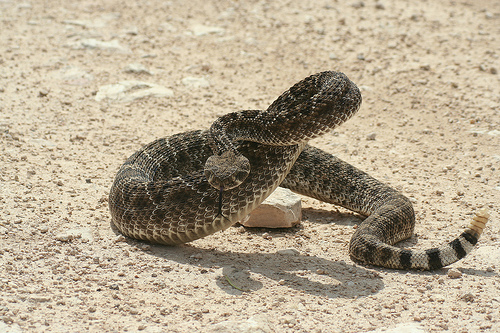RATTLESNAKE VACCINE K9 2ND
Our Records show it's time for your pet to receive a Rattlesnake vaccine.
Rattlesnake vaccine is a relatively new product recently approved for use throughout the United States. Ranchers and veterinarians have long known that after having been repeatedly bitten, dogs become resistant to rattlesnake bites. Vaccination works the same way – it will make your dog resistant but not immune. A vaccinated dog is much less likely to suffer permanent injury or die from rattlesnake bite, but it is still possible.
The vaccine is usually administered as two (for dogs > 25 lbs) or three (dogs < 25 lbs) injections the first year, with a booster each year after that (although some dogs warrant a booster twice per year - your veterinarian will discuss your dog's needs with you).
Every dog living in the Big Country is at risk of running into a rattlesnake. If you live where rattlesnakes are being seen, or if your dog goes hunting, herding, camping, to the barn, lives on a ranch, etc., vaccination is critically important.
Rattlesnake strikes on dogs usually involve their head/neck or front feet. Unvaccinated dogs struck on the head or face can swell so severely that they suffocate before ever getting to the veterinary hospital for treatment. Those unvaccinated dogs fortunate enough to survive the initial snake strike can slough, or lose, huge areas of skin, leaving gaping wounds requiring months of hydrotherapy and additional surgeries to close. On the other hand, vaccinated dogs generally have dramatically reduced mortality, swelling, hospitalization time, and skin slough; it is commonly unnecessary to use antivenin with vaccinated dogs. Rattlesnake vaccinations have got to have one of the best returns on investment of any preventative care known to veterinary medicine!
Rattlesnake antivenin (not vaccine) is made from the blood serum of hyper immunized horses. A single dose of antivenin can make dogs so sensitive to horse serum that a subsequent dose of antivenin is rapidly fatal. This means that if your antivenin-treated dog gets struck by a rattler again, his treatment options are highly limited. If your dog has already been treated with antivenin, immunizing your dog with Rattlesnake vaccine eliminates the risk from additional antivenin by eliminating the need for antivenin.












